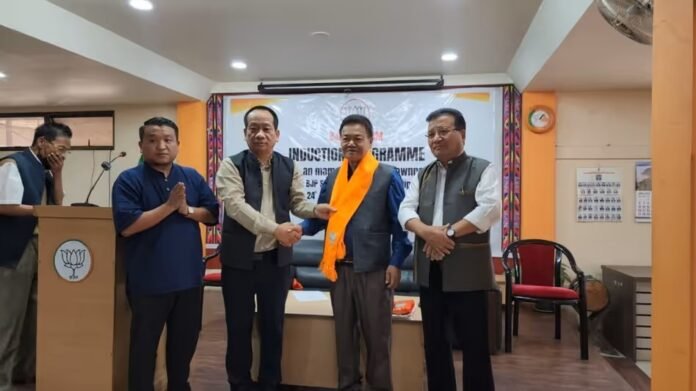Bharatiya Janata Party (BJP) leader N Zangura was officially sworn in as the new Chief Executive Member (CEM) of the Lai Autonomous District Council (LADC). The ceremony, held in Lawngtlai district headquarters, marks a significant win for the BJP in the state’s local governance landscape and reflects the party’s growing influence among tribal communities.
Zangura’s appointment follows the recent victory of the BJP in the LADC elections, where the party secured a clear majority. With this swearing-in, the BJP now assumes key control over the Lai region’s governance, making it a vital step toward expanding the party’s grassroots presence in Mizoram.
Read More: Tripura to Launch Forest Intelligence Wing to Strengthen Wildlife and Forest Protection Measures
The swearing-in ceremony was attended by BJP state leaders, council members, and local dignitaries. It was seen not just as a political milestone but as a moment of cultural pride for the Lai people, one of the major tribal groups in Mizoram’s southern region.
Taking oath of office, N Zangura promised to work for the holistic development of the Lai Autonomous District and ensure that welfare schemes effectively reach every village. He highlighted the need to improve roads, healthcare, education, and livelihood options in the region, which often faces neglect due to geographical isolation.
The Lai Autonomous District Council is one of three autonomous councils in Mizoram formed under the Sixth Schedule of the Indian Constitution. It has administrative and financial powers to govern areas with a predominantly Lai tribal population, especially in Lawngtlai district. The role of the council is crucial in preserving cultural identity while addressing development needs in line with local traditions.
In his inaugural address, Zangura emphasized inclusive development, transparency in administration, and youth empowerment as top priorities. He also underlined the need to attract more state and central government projects to the region, promising close coordination with Mizoram’s state machinery and the central leadership.
The BJP’s strong performance in the LADC elections has added momentum to the party’s efforts to strengthen its base in the Northeast. Traditionally a stronghold of regional parties and the Congress, Mizoram has seen a gradual rise in BJP’s influence, especially through autonomous councils and local governance platforms.
BJP leaders at the event praised Zangura for his leadership qualities and deep connection with the grassroots. They expressed confidence that his leadership would bring positive change to the Lai region and help build trust in the BJP’s development agenda.
Local residents and civil society representatives welcomed the new leadership but also reminded the administration of the challenges that lie ahead. Key issues raised by the public include lack of drinking water facilities, poor connectivity, insufficient job opportunities for youth, and the need for better healthcare in rural areas.
Zangura has acknowledged these concerns and assured that his administration would take up development projects on a war footing. He also promised periodic consultations with village councils and local community leaders to maintain transparency and inclusivity in decision-making.
The new CEM will soon announce his executive team, which will include council members assigned to specific portfolios such as education, public works, health, and social welfare. The BJP has said it will prioritize efficiency and integrity while selecting these members.
Political analysts see Zangura’s rise as a strategic gain for the BJP, as it attempts to expand its footprint across the tribal belts of the Northeast. It also signals a shift in local political preferences, with communities increasingly opting for national parties to address development aspirations.
As N Zangura begins his tenure as the Chief Executive Member of the Lai Autonomous District Council, expectations are high for a responsive and development-oriented administration. For the people of the Lai region, his leadership marks a fresh start and a new opportunity to bridge the gap between local needs and policy execution.


